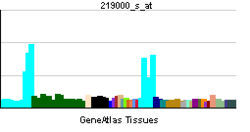- DCC1
-
Defective in sister chromatid cohesion 1 homolog (S. cerevisiae) Identifiers Symbols DSCC1; DCC1; MGC5528 External IDs OMIM: 613203 MGI: 1919357 HomoloGene: 5464 GeneCards: DSCC1 Gene Gene Ontology Molecular function • DNA binding
• protein bindingCellular component • chromosome, centromeric region
• chromatin
• nucleus
• nucleoplasmBiological process • regulation of DNA replication
• cell cycle
• maintenance of mitotic sister chromatid cohesion
• post-translational protein acetylationSources: Amigo / QuickGO RNA expression pattern 
More reference expression data Orthologs Species Human Mouse Entrez 79075 72107 Ensembl ENSG00000136982 ENSMUSG00000022422 UniProt Q9BVC3 n/a RefSeq (mRNA) NM_024094 NM_183089.2 RefSeq (protein) NP_076999 NP_898912.2 Location (UCSC) Chr 8:
120.85 – 120.87 MbChr 15:
54.91 – 54.92 MbPubMed search [1] [2] Sister chromatid cohesion protein DCC1 is a protein that in humans is encoded by the DSCC1 gene.[1][2]
Interactions
DCC1 has been shown to interact with CHTF18.[1][3]
References
- ^ a b Merkle CJ, Karnitz LM, Henry-Sanchez JT, Chen J (Aug 2003). "Cloning and characterization of hCTF18, hCTF8, and hDCC1. Human homologs of a Saccharomyces cerevisiae complex involved in sister chromatid cohesion establishment". J Biol Chem 278 (32): 30051–6. doi:10.1074/jbc.M211591200. PMID 12766176.
- ^ "Entrez Gene: DCC1 defective in sister chromatid cohesion homolog 1 (S. cerevisiae)". http://www.ncbi.nlm.nih.gov/sites/entrez?Db=gene&Cmd=ShowDetailView&TermToSearch=79075.
- ^ Bermudez, Vladimir P; Maniwa Yoshimasa, Tappin Inger, Ozato Keiko, Yokomori Kyoko, Hurwitz Jerard (Sep. 2003). "The alternative Ctf18-Dcc1-Ctf8-replication factor C complex required for sister chromatid cohesion loads proliferating cell nuclear antigen onto DNA". Proc. Natl. Acad. Sci. U.S.A. (United States) 100 (18): 10237–42. doi:10.1073/pnas.1434308100. ISSN 0027-8424. PMC 193545. PMID 12930902. http://www.pubmedcentral.nih.gov/articlerender.fcgi?tool=pmcentrez&artid=193545.
Further reading
- Ohta S, Shiomi Y, Sugimoto K, et al. (2002). "A proteomics approach to identify proliferating cell nuclear antigen (PCNA)-binding proteins in human cell lysates. Identification of the human CHL12/RFCs2-5 complex as a novel PCNA-binding protein.". J. Biol. Chem. 277 (43): 40362–7. doi:10.1074/jbc.M206194200. PMID 12171929.
- Strausberg RL, Feingold EA, Grouse LH, et al. (2003). "Generation and initial analysis of more than 15,000 full-length human and mouse cDNA sequences.". Proc. Natl. Acad. Sci. U.S.A. 99 (26): 16899–903. doi:10.1073/pnas.242603899. PMC 139241. PMID 12477932. http://www.pubmedcentral.nih.gov/articlerender.fcgi?tool=pmcentrez&artid=139241.
- Bermudez VP, Maniwa Y, Tappin I, et al. (2003). "The alternative Ctf18-Dcc1-Ctf8-replication factor C complex required for sister chromatid cohesion loads proliferating cell nuclear antigen onto DNA.". Proc. Natl. Acad. Sci. U.S.A. 100 (18): 10237–42. doi:10.1073/pnas.1434308100. PMC 193545. PMID 12930902. http://www.pubmedcentral.nih.gov/articlerender.fcgi?tool=pmcentrez&artid=193545.
- Clark HF, Gurney AL, Abaya E, et al. (2003). "The secreted protein discovery initiative (SPDI), a large-scale effort to identify novel human secreted and transmembrane proteins: a bioinformatics assessment.". Genome Res. 13 (10): 2265–70. doi:10.1101/gr.1293003. PMC 403697. PMID 12975309. http://www.pubmedcentral.nih.gov/articlerender.fcgi?tool=pmcentrez&artid=403697.
- Ota T, Suzuki Y, Nishikawa T, et al. (2004). "Complete sequencing and characterization of 21,243 full-length human cDNAs.". Nat. Genet. 36 (1): 40–5. doi:10.1038/ng1285. PMID 14702039.
- Rual JF, Venkatesan K, Hao T, et al. (2005). "Towards a proteome-scale map of the human protein-protein interaction network.". Nature 437 (7062): 1173–8. doi:10.1038/nature04209. PMID 16189514.
Categories:- Human proteins
- Chromosome 8 gene stubs
Wikimedia Foundation. 2010.
